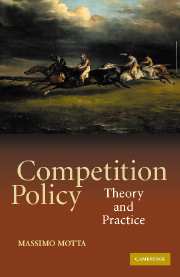Book contents
- Frontmatter
- Dedication
- Contents
- List of Figures
- List of Tables
- Preface
- Acknowledgements
- List of Abbreviations
- 1 Competition Policy: History, Objectives, and the Law
- 2 Market Power and Welfare: Introduction
- 3 Market Definition and the Assessment of Market Power
- 4 Collusion and Horizontal Agreements
- 5 Horizontal Mergers
- 6 Vertical Restraints and Vertical Mergers
- 7 Predation, Monopolisation, and Other Abusive Practices
- 8 A Toolkit: Game Theory and Imperfect Competition Models
- Bibliography
- References to Cases and Legislation
- Index
3 - Market Definition and the Assessment of Market Power
Published online by Cambridge University Press: 05 August 2015
- Frontmatter
- Dedication
- Contents
- List of Figures
- List of Tables
- Preface
- Acknowledgements
- List of Abbreviations
- 1 Competition Policy: History, Objectives, and the Law
- 2 Market Power and Welfare: Introduction
- 3 Market Definition and the Assessment of Market Power
- 4 Collusion and Horizontal Agreements
- 5 Horizontal Mergers
- 6 Vertical Restraints and Vertical Mergers
- 7 Predation, Monopolisation, and Other Abusive Practices
- 8 A Toolkit: Game Theory and Imperfect Competition Models
- Bibliography
- References to Cases and Legislation
- Index
Summary
INTRODUCTION
As we have seen, the concept of market power is central to competition policy. So far, we have dealt with this concept from a theoretical point of view. This chapter introduces the reader to the issue of how market power should be assessed in practice. Many competition law investigations will start with such an assessment.
Ideally, one would like to estimate directly the extent to which a firm has (or increases its) market power. In merger cases, for instance, one might want to understand whether the merging firms will be able to profitably raise prices above the current level. Some modern econometric techniques (briefly analysed in the technical Section 3.3.2) allow us to do precisely that.
However, in many circumstances these econometric exercises are not feasible for lack of reliable data, and even when they are feasible, it might be a good idea to complement their results with the more traditional approach that evaluates the market power of firms by analysing the market in which they operate. In turn, this requires defining the “relevant market”, that is the set of products and geographical areas to which the products of the merging firms belong. It is such a set of products (and areas) that might create competitive constraints to the firms under analysis.
In this perspective, the definition of the market (both from its product and geographical points of view) is a preliminary step towards the assessment of market power.
In this chapter, I first discuss how to define a market (Section 3.2) and then how to assess market power (Section 3.3) so as to mimic the sequence that cases often follow in many anti-trust jurisdictions. Nevertheless, it should be stressed first that market definition is not of interest by itself, but only as a preliminary step towards the objective of assessing market power.
- Type
- Chapter
- Information
- Competition PolicyTheory and Practice, pp. 101 - 136Publisher: Cambridge University PressPrint publication year: 2004



